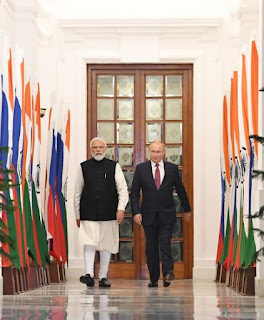Russia is a time tested strategic ally, the largest defence supplier and is lately supplying oil to India. New Delhi is well aware that Moscow has used veto power to block unpalatable resolutions against India.
New Delhi: Due to the Russia-Ukraine war growing murkier by the day, India's position is becoming more challenging. As it is, China is a problematic giant neighbour which has Pakistan in its kitty. China-Russia axis against India would certainly be a catastrophe.
Moreover, Moscow has been a friend through thick and thin since the 1960s, during the 1971 war and on multiple occasions. In contrast, the United States has, from time to time, sided with the wrong side of history. During Bangladesh's war of independence, it sided with brutal Pakistan and allowed Islamabad to commit more atrocities on civilians.
Thus, there are merits in the tightrope walk by India. In contrast, again, it can be safely said the US and NATO tried to bite off more than they could actually chew. Therefore, as the war lingers - now almost a month-NATO is worried if not nervous about the perception war.
Experts say it is crucially important for NATO to be seen as being able to 'win' the ongoing war. Failure to do so would easily call into question NATO's credibility and US's grip on world affairs, especially after the Afghanistan fiasco. The world had faced the same situation in 1998-99 when NATO was in conflict with Yugoslav leader Slobodan Milošević.
The gravity of the crisis is more, and hence there is pressure on India to take sides rather unambiguously in favour of the west. But New Delhi is doing all its calculations by keeping its own interest in mind.
Notwithstanding the conflict, Russia remains India's key defence supplier and lately supplying oil. India is buying oil from Moscow.
India has to keep focusing on competitive energy sources as it is highly dependent on imports for the same, sources said. Countries with oil self-sufficiency or those importing themselves from Russia "cannot credibly advocate" restrictive trading.
But western hypocrisy is not new. Europe is still buying Russian oil and gas. These have been kept out of sanctions. Why? Because it is in the interest of global moral police - the west.
These countries want both the 'moral high ground' and Russian gas, but Asian players like India can have neither. The west was critical of India when Indira Gandhi ordered the first nuclear test.
Moscow said the 'peaceful' nature of the test was appreciable. In 2020, when China attacked India, the west generally preferred to stay away or play safe.
Thus the argument among those in the know about things is that New Delhi cannot dump an old friend for the sake of new allies who have a global reputation of looking the other way when the real challenge comes in.
Look at Ukraine itself. Other than painting the war as a fight between autocracy and democracy, the US-led NATO or Europe have not done much for Ukraine.
New Delhi's foreign policy engine room truly understands all these ramifications. In fact, India is not alone in not taking sides in the ongoing war. New Delhi is a close US ally in the Quad and a key trade partner. Russia is a time tested strategic ally and also the largest defence supplier.
UAE, Sri Lanka and even Bangladesh and Pakistan have preferred to stay isolated so far. Imran Khan's travel to Moscow was like one of the wide balls - not talked about much.
For India, keeping effective communication with both Russian President Vladimir Putin and Zelensky of Ukraine was important to ensure the speedy evacuation of stranded Indians. It saved many lives, but there is not much talk about these.
New Delhi is well aware that Moscow has used veto power to block unpalatable resolutions against India. Not to forget, in 1957, Russia had blocked a UN proposal to deploy UN forces to Kashmir. In 1961, Russia had voted against the UN resolution asking India to withdraw from Goa. In 1962, Moscow blocked a Pakistan-sponsored resolution on Kashmir. So, a friend in need is a friend indeed. It's so logical.
NATO's expansion agenda and to rope in Ukraine had provoked Russia. Such misadventures are not new for the west and their 'holier than thou' policymakers.
On March 24, 1999, India's Permanent Representative to the UN, Kamalesh Sharma had, said at the UNSC debate: "What NATO has tried to do is to intimidate a government through the threat of attack and now through direct and unprovoked aggression....There are several traditional descriptions of this kind of coercion, peacekeeping is not one of them." The remarks sound relevant in 2022 as well.
 |
| Gorbachev |






No comments:
Post a Comment